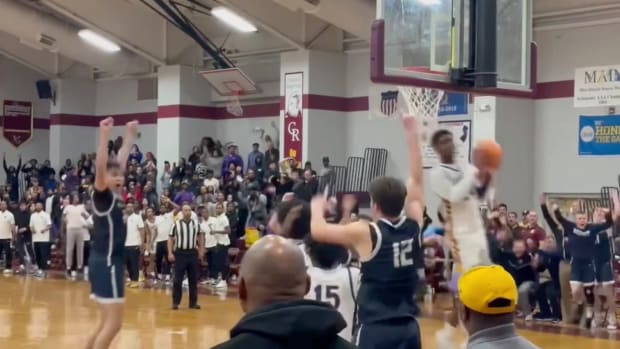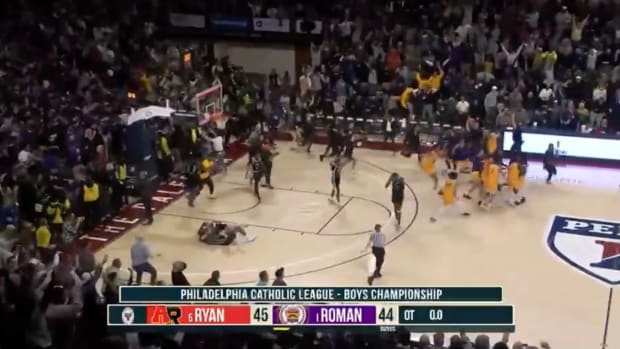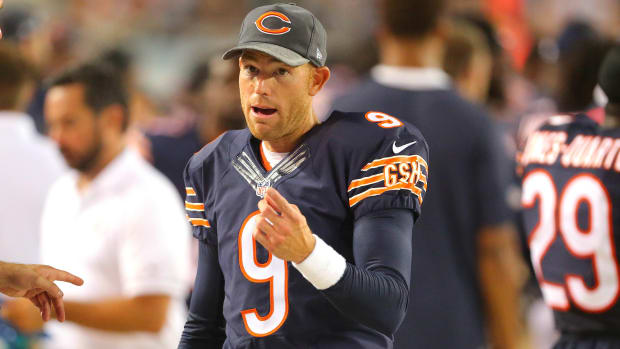
Loyola Academy players travel to play in land of their forefathers
They make the 50-yard walk from the locker room on the east side of campus through the front gates on the west side of Sachs Stadium. Before they approach the turf field, they tap the replica helmet that honors a fallen coach, John Hoerster, who died in 2004.
At approximately 1:30 p.m on five late summer and fall Saturdays, the Ramblers kick off and play a football game. It's tradition, routine.
This week that tradition has been turned upside down. Instead of playing on Saturday, they will play on Friday. But that's not what's truly significant. When Loyola takes the field at 8:00 p.m. local time on Aug. 31, the players' cleats will touch a grass surface inside of a 6,000 capacity stadium used primarily for rugby friendlies.
And when the Ramblers and their opponent listen to the national anthem, they will be standing six time zones away from home, in Dublin, Ireland. One of six high school football games taking place in Dublin as part of the Global Ireland Football Tournament, Loyola and Dallas Jesuit will square off more than 3,500 miles away from the confines of the Ramblers' home field in Wilmette, Ill.
"If you told me 10 years ago I'd be flying to Ireland to watch my kid play in a high school football game, I'd say you were nuts," said John Sullivan, whose son Cody, is a linebacker for Loyola.
A private Catholic high school about 20 miles north of Chicago, Loyola Academy was founded in 1909. It's distinguished by the diversity of its student body -- more than 100 zip codes are represented -- and by its famous alumni, which include recent Olympic gold medalist Conor Dwyer and CSI actor Chris O'Donnell. The reason for taking this trip over the pond is as much about fellowship as it is about football.
"Football for Loyola and [the other schools going] is a great community builder. It means a lot to these school communities as there is a really rich history in all of these places of the tradition of football," said Loyola President Fr. Patrick E. McGrath. "But from the get-go, I want to make it clear that this is not just about football."
That is true for many of the players, parents, students, teachers, coaches and others associated with the school traveling to Ireland. The flight from Chicago to Dublin may be 3,661 miles, but for many making the trip, in a sense, it's a journey home.
Luke Ford is a 6-foot-3, 200-pound senior safety for the Ramblers; his bright red hair is a dead giveaway to his Irish heritage. Almost 60 years ago, his grandfather, Kevin Gaughan, was forced to flee his home in Ballina, Ireland, because he was a persecuted Catholic living under Protestant rule.
"There was a lot of unrest at the time," said Doris Reynolds, Gaughan's daughter and Ford's aunt. "He would be rousted out of bed by the police, just as an annoyance, because he was Catholic living in a Protestant area."
Leaving his wife, Kathleen, and four children behind, Gaughan spent a year in Canada before he landed in Chicago. He sent for his family over time.
Now 91, Gaughan has never returned to Ireland, still angry over how he and his family were treated. From his home in Glenview, Ill., he will watch his grandson play a football game in his native country thanks to a transcontinental internet connection. Gaughan's sister, Philomina, still lives in Bellina along with several other relatives. The hope is that Ford and the other members of his family making the trip -- his mother, Geri Ford, and aunt, Carmel Gaughan -- can meet them for the first time while on Irish soil.
"When you think about the sacrifices my aunt and uncle made it's something you think about," said Ford. "Could I do that? Could I maintain my composure if my dad went over to China to work and brought me over two years later? I don't know if I could handle something like that, so it will be really special to see how and where they were raised."
A 6-foot, 200-pound bruising middle linebacker for the Ramblers, Cody Sullivan owns a last name that takes up half the Irish phone book. It conjures images of pubs with marquee namesakes such as "Mac Sullivan's Speakeasy" or "O'Sullivan's Tavern". When Sullivan lands in Dublin, the Loyola senior will be joined by his father, John, and his younger sister, Kylie, a current sophomore at Loyola.
It will be the first time that John Sullivan has set foot in Ireland, a country both his parents fled for America more than 50 years ago after growing tired of the limited economic opportunities. When Cody and Kylie arrive at their hotel south of Dublin, their great uncle, Bernard Conlon, will greet them. He will most likely take his nephew John out for fish and chips and a pint, and then after the football game, drive them to their grandmother's old house, which just so happens to be located less than a mile from Donnybrook Stadium.
"He's going to give us a drive by and see where they all grew up, where it all began," said John Sullivan. "It's still standing and one or two of them are still in it. I've been told I can visit a relative every day and I wouldn't have any doubles for the first year and half."
Said Cody: "It's our first time to experience this and we get to do it together. I just want to see where she grew up, where my roots are from. It really is a once in a lifetime experience."
At 76 and living in an assisted living facility on Chicago's northwest side, Dorothy Sullivan won't make the trip. But she'll be in front of a computer, watching her grandson play a football game one long ocean away. In spite of the distance, you can't help but believe that they'll be closer than ever.
When the Ramblers, all 100 of them, take the field at Donnybrook, their maroon and gold jerseys standing out from the green and grey backdrop of the rugby pitch, they'll wear uniform numbers attached to names such as Grady, Ryan, Holley, Murphy, Sullivan and Ford. What those names represent, though, is transcendent: generations of time, struggles endured, the legacy of family.
"My dad worked hard to get where he is today," said Cody Sullivan. "There's a lot of history behind hardworking people and I want to appreciate the sacrifices people made for me."



